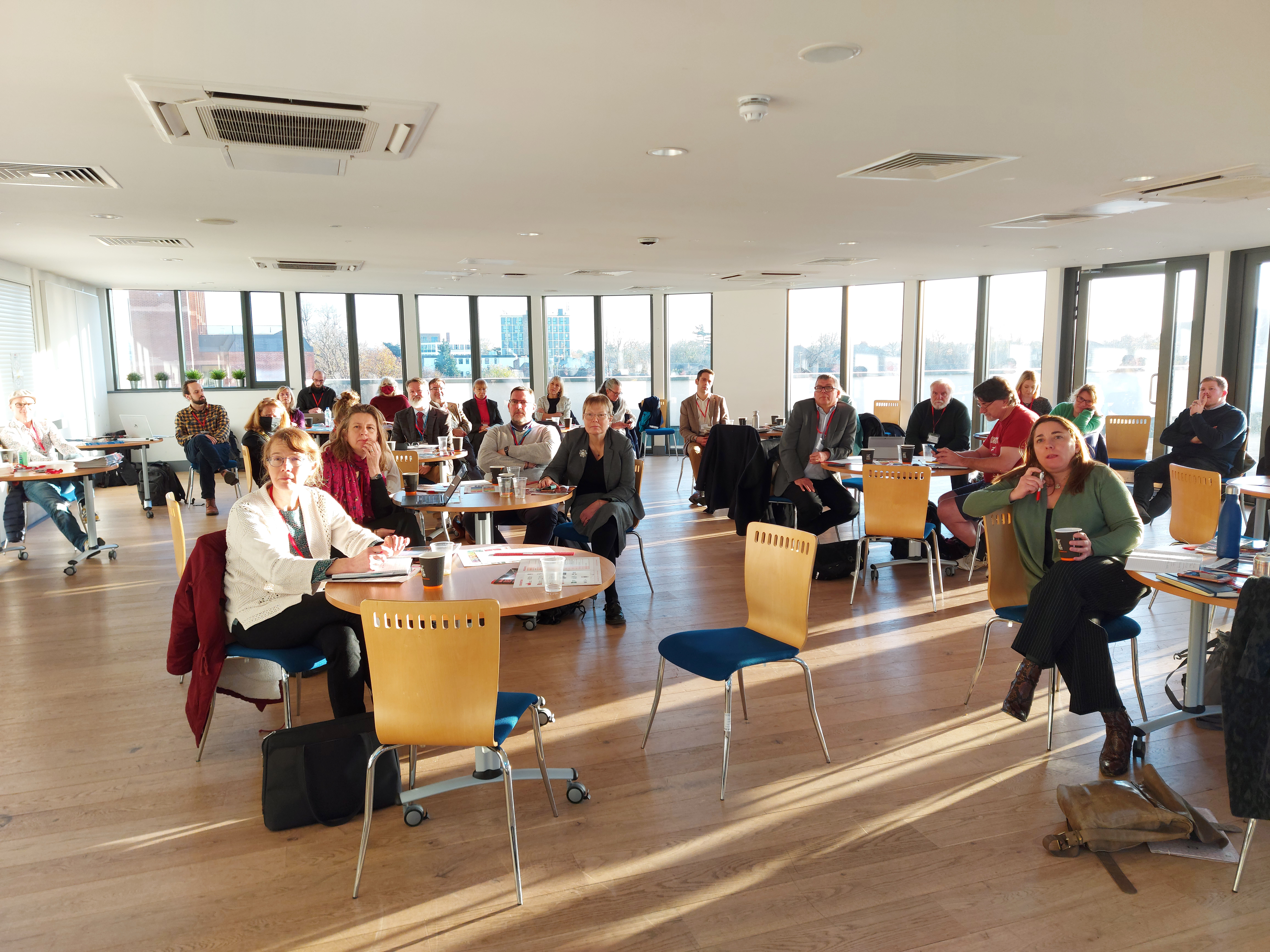Written by Dr Joshua Heyes
On Thursday 25th November, the epistemic insight team met with partners from across our consortium institutions and schools to share a day of engagement and reflection on the work going on across the different strands of the project.
In the picturesque top room of the Exchange facility in Twickenham we spent the day hearing about how tools and concepts being developed in the project are being applied differently in schools and universities across the country. We found that the presentations helped us answer a series of questions about the importance and usefulness of EI in different educational contexts:
How does epistemic insight help embed science in primary initial teacher education (ITE)?
Leigh Hoath from Leeds Trinity University started us off with her presentation ‘Knowledge or No-ledge – a tentative foray’, discussing her important work promoting and integrating an expanded science provision in primary ITE. Leigh argued for the importance of primary teachers having a substantial understanding of ‘how knowledge works’ and showed us how she is embedding tools and concepts from epistemic insight in her leadership of programmes at Leeds Trinity University.
How does epistemic insight help develop research-engaged teachers?
Next up, Lee Hazeldine from the LASAR team presented a selection of all the hands-on practical work we are doing embedding epistemic insight in ITE at Canterbury Christ Church University. Lee focused on our work developing research-engaged teachers through ITE programmes, for example, supporting students to create research methodologies for publication on Zenodo, an Open Science platform. One delegate wondered whether all the work that students were doing was tied to assessment or whether it was ‘extra’ to the core module work. Lee explained that the ‘teacher-as-researcher’ work we are doing is embedded in the learning outcomes of the module and mentioned that there was a strong appeal to students. Conducting research that is published and presented on an Open Science platform not only directly enriches their practice but is something that helps them ‘stand out’ in their next career step. In the discussion, Jane Essex from the University of Strathclyde also pointed out that epistemically insightful approaches resonate with recommendations from the latest research on SEN and inclusive education – inquiry into ‘Big Questions’ drives curiosity and starts from ‘where the student is at’ rather than assuming or requiring prior knowledge.
What does epistemic insight look like when it forms the basis of a school’s educational vision?
Next, Michelle Lawson, Headteacher of Wilmington Grammar School for Girls, presented on how Wilmington has embedded epistemic insight into its vision, values and pedagogical approach. Michelle reminded us that epistemic insight is not only for the more ‘academic’ students but is something that can underpin an entire school ethos. Wilmington works carefully to set up its year 7 students for their journey in becoming epistemically insightful, structuring the initial stages of their secondary education around the cross-curricular question of ‘what does it mean to be human’. The programme has been a great success at Wilmington and Michelle told many stories of students starting to make connections across their learning, challenging teachers in one subject with thinking they have brought in from another.
How does epistemic insight enrich secondary science ITE?
Rob Campbell of St. Mary’s University, Twickenham, presented on his work with secondary science ITE. He found that his students’ initial explanations of the uniqueness of science varied, with many considering science to be ‘limitless’ in what questions it could answer or problems it could solve. Rob explained how he got his students to start building connections between science and other disciplines in their thinking, pointing out the opportunities that the new Core Curriculum Framework provides for this. Rob showed us very usefully the many ‘points of entry’ for building in epistemic insight in both this and in other important new education policy developments.
How does epistemic insight help ground the philosophical vision of primary ITE?
Paul Hopkins from University of Hull finished off the day by leading us full circle back to consider what it is we talk about when we talk about knowledge. Paul described how practical science experiments create the engagement and interest necessary to support the development of scientific knowledge. Primary school students can be drawn into thinking scientifically by taking seriously the practical, everyday knowledge and understanding that they already have, however limited. Paul described how his primary ITE students engaged effectively with terminology such as ‘epistemology’ and how this helped them reflect on their practice.
The day was a great success and provided an excellent showcase for our work so far. The breadth and depth of how epistemic insight is being applied across different educational contexts shows great promise for the future possibilities and potential of the project going forward.
PHOTOS by Dr Aga Gordon

